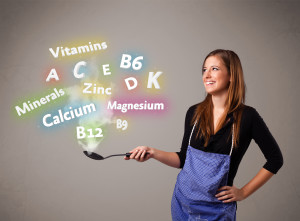The Most Common Vitamin Deficiencies for Women
 Do you know your ABCs? No, not those—the ABCs of a healthy diet. We’re talking about the vitamins, minerals, and nutrients that women need for optimal health. Even if you think you know which letters of the alphabet make essential vitamins (C? D? A?) ask yourself the more important question: Are you getting enough of each one? Despite our best efforts to eat healthily, many women are deficient in at least one essential nutrient. To make sure you are staying healthy, especially through winter cold and flu season, study up on the A, B-12, Cs of vitamins that you need in your diet.
Do you know your ABCs? No, not those—the ABCs of a healthy diet. We’re talking about the vitamins, minerals, and nutrients that women need for optimal health. Even if you think you know which letters of the alphabet make essential vitamins (C? D? A?) ask yourself the more important question: Are you getting enough of each one? Despite our best efforts to eat healthily, many women are deficient in at least one essential nutrient. To make sure you are staying healthy, especially through winter cold and flu season, study up on the A, B-12, Cs of vitamins that you need in your diet.
Vitamin A
According to the World Health Organization (WHO) vitamin A deficiency (VAD) is the leading cause of preventable blindness in children. In the most severe cases, it may also lead to night blindness in pregnant women, and increase the risk of maternal mortality. Symptoms of vitamin A deficiency may include dry eyes and skin, and an inability to see in dim light. Protect yourself, especially if you are pregnant or hoping to become pregnant, by ensuring your diet includes such vitamin A-rich foods as carrots, sweet potatoes, kale, spinach, broccoli, and eggs.
B-12
Many women don’t get enough of vitamin B-12, a vitamin essential for promoting neurological function, making red blood cells, and improving healthy digestion. Basically, vitamin B-12 is a big deal. Especially if you are a vegetarian, or eating a gluten-free diet, you may not be getting enough B-12. Women who are pregnant should also talk to their OBGYN about increasing their B-12 intake. Side effects of B-12 deficiency may include fatigue, anemia, tingling in the extremities, confusion, and a swollen tongue. To ensure you’re getting enough B-12, increase your intake of eggs, milk products, cheese, meat, fish, shellfish, and poultry.
Calcium
Women need calcium to promote healthy bones and minimize their chances of developing osteoporosis as they age. Unfortunately, even those who love their ice cream are often Calcium deficient. Symptoms may include muscle cramps or muscle weakness, fatigue, irritability, and a tingling sensation in the limbs. You can find ways to add calcium to your diet without adding more dairy, which is good news for women who are lactose intolerant. Other calcium-rich foods include almonds, broccoli, figs, oranges, sardines, navy beans, kale, and tofu.
Vitamin D
You know vitamin D as the sunshine vitamin, but what you may not know is that many women don’t get enough of it—especially those who are sun-conscious and those who live in a cloudy climate. Vitamin D is essential for protecting the immune system and fortifying our bones. If you’re pregnant, your OBGYN will likely want you to increase your Vitamin D intake as well. If you’re vitamin D deficient, you may experience fatigue, fragile bones, depression, or be at higher risk for obesity, and type II diabetes. Vitamin D doesn’t occur naturally in many foods, so to make sure you’re getting enough. Try to spend 15 to 30 minutes a day in the sun (and remember to apply sunscreen in all seasons). You may also be able to boost your vitamin D by eating foods fortified with extra vitamin D, such as breakfast cereals, as well as milk, egg yolks, cheese, yogurt, and salmon.
Folic Acid
Folic acid is responsible for helping to produce red blood cells and is essential for proper DNA production, which makes it another necessary vitamin for pregnant women, and especially for women looking to conceive. Symptoms of a folic acid deficiency may include fatigue, mouth sores, and gray hair. It may also cause anemia, a condition with such symptoms as weakness, irritability, shortness of breath, and pale skin. Foods rich in folic acid include spinach and other leafy greens, citrus fruits, beans, and rice.
Iodine
Iodine is a nutrient that is responsible for helping to regulate the thyroid hormones that control the metabolism. Iodine deficiency is particularly dangerous for women who are pregnant and their fetus, which is why many prenatal vitamins include iodine. Women who are suffering from an iodine deficiency may experience a swelling of the thyroid around the throat (known as goiter), weight gain, fatigue, thinning hair, and constantly feeling cold. Fortify your diet with iodine-rich foods, such as sea vegetables like kelp, cranberries, yogurt, navy beans, strawberries, and cheese.
Iron
That’s right; Popeye isn’t the only one who needs spinach. You do too, Olive Oil. Since women menstruate monthly, they are at a higher risk of being iron deficient. Even pregnant women are susceptible to iron deficiency, which could cause fatigue, shortness of breath, dizziness, and brittle nails. Make sure you’re getting enough iron-rich foods, such as spinach, lentils, pumpkin seeds, raisins, quinoa, and…dark chocolate. You’re welcome.
If you are pregnant or hoping to become pregnant, and have any questions or concerns about your diet or vitamin intake, talk to your OBGYN. Your doctor can help you put a plan in place to make sure you maintain healthy levels of all your vitamin A, B, Cs.
More